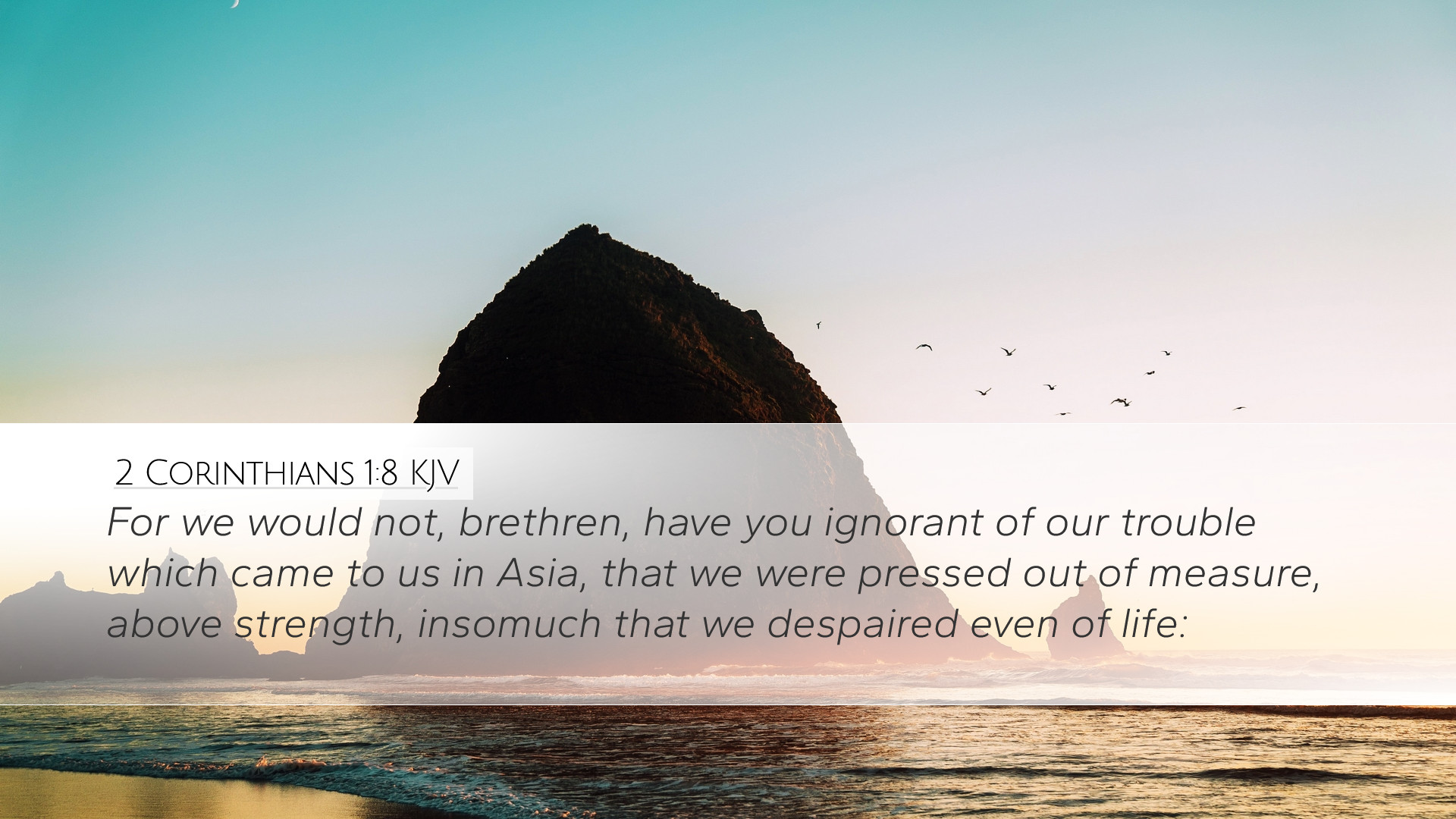Commentary on 2 Corinthians 1:8
2 Corinthians 1:8 states: "For we do not want you to be unaware, brothers, of the affliction we experienced in Asia. For we were so utterly burdened beyond our strength that we despaired of life itself."
Introduction
This passage is a profound reflection on the Apostle Paul's experiences and the hardships he faced during his ministry. It serves as a reminder of the struggles inherent in a faithful life and offers insight into God's sufficiency in times of distress. The insights provided by prominent biblical commentators such as Matthew Henry, Albert Barnes, and Adam Clarke enrich our understanding of this verse.
Paul's Context of Affliction
Paul speaks candidly about his sufferings, emphasizing both the severity and the emotional toll these challenges had on him. According to Matthew Henry, these afflictions were not merely physical but also spiritual and emotional; they were burdens that tested Paul's very being.
- Henry's Insight: Henry notes that the intention of Paul in sharing this experience was to foster empathy and understanding among believers. By revealing his struggles, Paul illustrates the reality that even Apostles face trials.
- Barnes' Commentary: Barnes emphasizes the "affliction" Paul refers to, suggesting it involved persecution and perhaps severe distress affecting his ministry. He interprets this not as a sign of weakness but as a testament to Paul's dedication and resilience.
- Adam Clarke's Perspective: Clarke provides an interpretation that connects this affliction to broader spiritual warfare and emphasizes the reality of suffering in the life of believers.
The Burden of Despair
Paul's description of being "utterly burdened beyond our strength" speaks to the intensity of his despair. This phrase encapsulates a state of feeling overwhelmed, which many in ministry or life experience. Each commentator sheds light on this burden:
- Matthew Henry: He highlights that this burden was intended to bring Paul to a point of reliance on God's power rather than his own. The feeling of despair, while painful, can propel one toward divine dependence.
- Albert Barnes: Barnes suggests that these moments of despair serve a purpose. They test faith and strengthen reliance on God's grace during times of difficulty.
- Adam Clarke: He takes an empathetic approach, affirming that every believer might encounter such feelings in their lives. Clarke encourages that sharing these experiences contributes to spiritual growth and community support.
Theological Implications
This verse invites us to contemplate the broader theological implications of suffering and despair within the Christian narrative:
- Suffering and Identification: As noted by all commentators, affliction facilitates a deeper identification with Christ's own sufferings, fostering a communal understanding among believers that trials are part of the Christian experience.
- Grace in Weakness: The acknowledgment of despair leads to the recognition of grace. Paul himself highlights in 2 Corinthians 12:9 that God's strength is made perfect in weakness. This reality is underscored by Henry and Barnes as essential to Christian life.
- Hope Beyond Despair: Despite the burdens, there is an inherent hope that permeates Paul's message. Commentators agree that while Paul expresses real pain, he ultimately points to the hope that believers have in Christ, which transcends earthly troubles.
Practical Application for Believers
Understanding 2 Corinthians 1:8 can profoundly impact how believers respond to their own trials:
- Vulnerability in Community: The sharing of burdens fosters community and support. Henry suggests that being open about struggles allows for empathetic responses from fellow believers.
- Relying on God: Just as Paul learned, believers are reminded to rely on God's strength rather than their own. This reliance can be transformative in overcoming personal despair.
- Encouragement to Others: Paul’s transparency serves as a model for encouraging others. As Christ's followers endure their own afflictions, they can find solace and encouragement in shared experiences.
Conclusion
In summary, 2 Corinthians 1:8 underscores a fundamental aspect of the Christian experience: the reality of suffering. Through the insights of Matthew Henry, Albert Barnes, and Adam Clarke, we glean valuable lessons regarding the nature of affliction, the importance of reliance on God's grace, and the transformative power of hope.
For pastors, students, theologians, and Bible scholars, this passage provides a meaningful exploration of the interplay between despair and divine grace, affirming that while trials may come, God's sufficiency always prevails.


